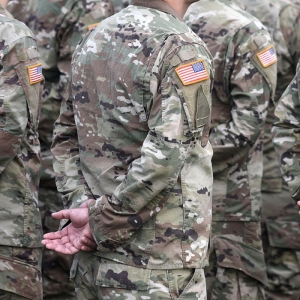Carl Castro Participates in PREVENTS Task Force at the White House
February 17, 2020 / by Constance Sommer- MVP
- Research
Veteran suicide rates continue to tick upward, despite the federal government spending vast sums of money and investing considerable time and resources to grapple with the issue. Now a new effort by the Trump administration is reaching out to tap into the expertise of community groups and leaders from around the nation―including Carl Castro, professor and director of the Military and Veterans Programs at the USC Suzanne Dworak-Peck School of Social Work.
“The idea,” Castro said, “is to marshal all the resources to make a dent in what’s happening now.”
A retired Army Colonel, Castro was one of 15 experts invited to participate in the National Association of Social Workers’ (NASW) PREVENTS task force. A new effort stemming from an executive order signed by President Trump in March 2019, PREVENTS aims to develop a “national public health roadmap” for preventing veteran suicide through community integration, research and implementation strategies. The focus group met at the White House in Washington D.C. on November 21-22, 2019 to discuss the role social work might play in preventing and reducing veteran suicide.
“This is a federal effort,” Castro said, “yet it is perhaps one of the few examples where the federal government sees the solution as lying at the local or community level.” PREVENTS held this first meeting to gain a deeper commitment from leaders within the National Association of Social Workers (NASW) for further discussions about how social workers can become directly involved. A diverse group of professionals came together, putting forth what each could contribute to the task force. This may be a unique moment for veteran suicide prevention as the majority of prevention efforts thus far have happened inside the Department of Defense and the Veterans Administration. The PREVENTS task force could tackle this problem in a much larger way.
“The most important line of effort is one that’s focused on community engagement, and empowering and supporting communities to address the issue of veteran suicide,” Castro said. “Normally, it becomes a federal agency that takes the lead in something like this. So this was a very refreshing approach, and one that can really benefit from the perspective and skills of the field of social work.”
The current statistics on veteran suicide are both startling and troubling. In 2017, the suicide rate for veterans was 1.5 times the rate for non-veteran adults, after adjusting for population differences in age and sex, according to the Veteran Administration’s 2019 National Veteran Suicide Prevention Report. From 2005 to 2017, suicides among veterans increased by 6.1 percent – though this was significantly less than the 43.6 percent suicide increase among all U.S. adults over the same period. And on average, the federal government reports, 20 service members and veterans die by suicide each day.
The initiative embraces the contributions of social workers, state and local officials, healthcare systems, providers and clinicians, faith-based and other nonprofit organizations, and veteran and military service organizations. For their part, social workers are the only profession that provides holistic care, Castro said.
“Suicides are unfortunately a tragic and enduring problem facing our nation,” he said. “This effort recognizes that it will take a full court press with everyone working together to address this issue.”
To reference the work of our faculty online, we ask that you directly quote their work where possible and attribute it to "FACULTY NAME, a professor in the USC Suzanne Dworak-Peck School of Social Work” (LINK: https://dworakpeck.usc.edu)
